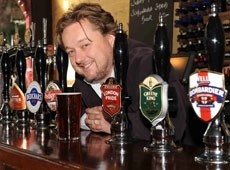Flying the flag for standards

You know how when you hear a new word for the first time, and it strikes you as curious and you make a point of learning it, and then for the next few weeks you seem to hear it all the time?
Last year I was touring pubs that had been refurbished as part of Everard's Project William scheme, and I first heard a phrase that has gone on to define much of what I see and hear about pubs.
We were in the Crown, in Beeston, on the outskirts of Nottingham. A year before our visit the pub had been less than impressive — one of those places that turns to flashier fonts and louder TVs in an attempt to keep its custom, and only ends up driving more of it away.
A year later, the local Campaign for Real Ale (CAMRA) branch named it as its pub of the year.
And there was one phrase that summed up the transformation. A former regular ventured back in on a lazy afternoon, cautiously treated himself to one of the dozen or so cask ales, took in the carpets, the new furniture and hop-entwined oak beams, nodded approvingly and said, "You could bring the wife in here."
The following day he did just that. And he wasn't the only one — by placing a focus on serving well-kept, locally brewed cask ales, beer sales there have soared.
But the largest percentage increase has been in wine sales — because the Crown is now exactly the kind of pub to which you can comfortably take the wife.
It's obviously not the first time I'd heard someone describe a pub in this way, but it did seem like the perfect description for this refurbished, revitalised pub that has defied the grim statistics on pub closures by rediscovering what pubs are supposed to be about — welcoming environments, with good quality drinks and good conversation.
I've just completed a research project for a family brewer, and we conducted some focus groups in one of the pubs the company had recently refurbished.
Even if my report turns out to be of no use, the groups have at least won that pub some new regulars. My research subjects who had not visited it before — or hadn't been there for years — were impressed.
Once again, praise for the standard of the décor, the range of food and drinks and the welcome was summed up by it being 'a place where you could bring the wife'.
I explored this idea further. Why was it important? If you can bring the wife to a pub, does that mean you get to go to pubs more, because she'll now want to come out as well?
Not quite. They told me that it's more about the general standard of the place, no matter who you're with. It's not enough for pubs to just be 'a pub' any more.
With closures, the price of a pint increasing and money remaining tight, these blokes are getting choosier about where they go to drink.
They simply don't want to be in some boozer where your feet stick to the floor, the toilets smell and some neds at the pool table are getting lairy. It's not necessarily that you will take the wife there — just that you could if you wanted to.
All Bar One
This reminded me of All Bar One. In the 1990s Mitchells & Butlers realised that pubs were missing out on half the UK population, and introduced a format with big windows, decent wine, good food, and no bar stools for leering regulars, creating spaces where women felt comfortable drinking alone or in single-sex groups.
In doing so, the company discovered the staggering fact that if you create a pub that has loads of women in it, for some unfathomable reason loads of men will want to go there too.
This rule is not without its exceptions. For a couple of centuries following the industrial revolution, most pubs were male-only establishments.
The times when some pubs actually banned women from entering are still well within living memory for many, and the old '70s sitcom stereotype of the pub as a place of welcome escape from the old battle-axe at home hasn't entirely disappeared for some.
The typical old boozer, full of eccentrics, characters, arcane conventions and tattered furniture has a certain charm for anyone who likes the romantic notion of the 'drinkers' pub'.
I love discovering these pubs, ordering a pint of foul lager from the filthy pipes, and forcing it down as I observe the latest instalments of the dramas that are played out at the bar every day.
And I'm not the only one. Last year, when Father Ted's — a local pub to me in London's Stoke Newington — closed down and re-emerged from its chrysalis as the Jolly Butchers, instantly staking a claim to being one of the best craft-beer pubs in London, many of the hipsters who flocked there to drink bemoaned the loss of the old place, nostalgically remembering the 3am drinking, the constantly broken windows, the stench of urine.
But while they mourned its passing, they clearly weren't that fond of it at the time — it was losing thousands every week. That's why it was sold. That's why it changed. And I for one can't keep the wife out of there these days.














